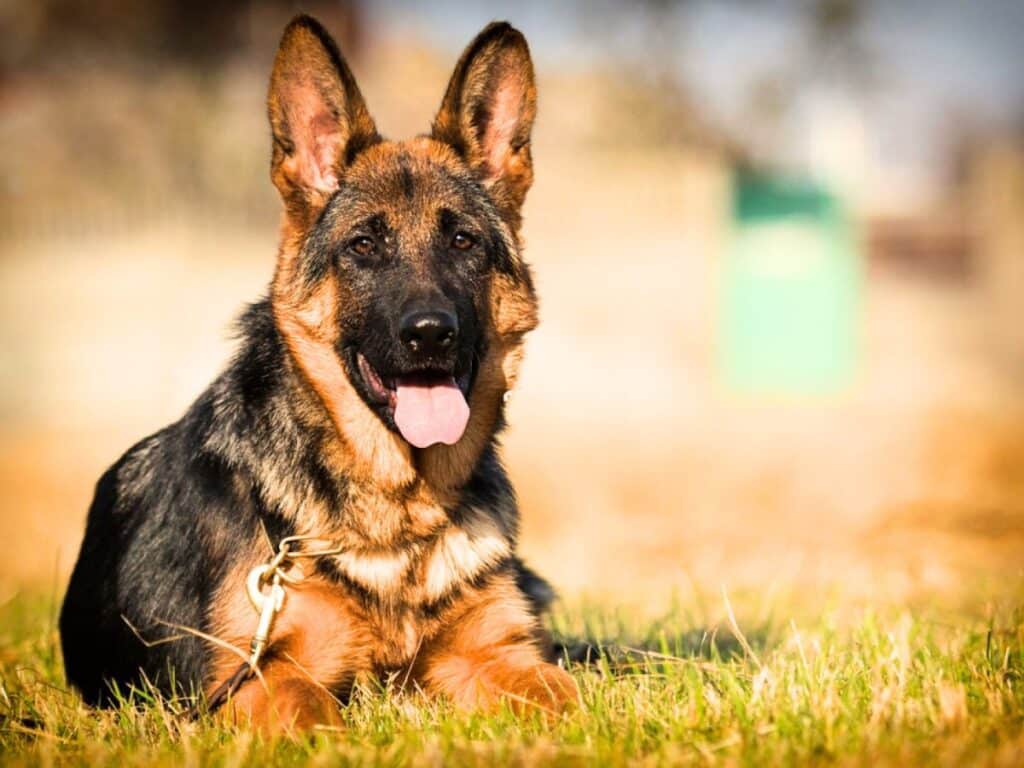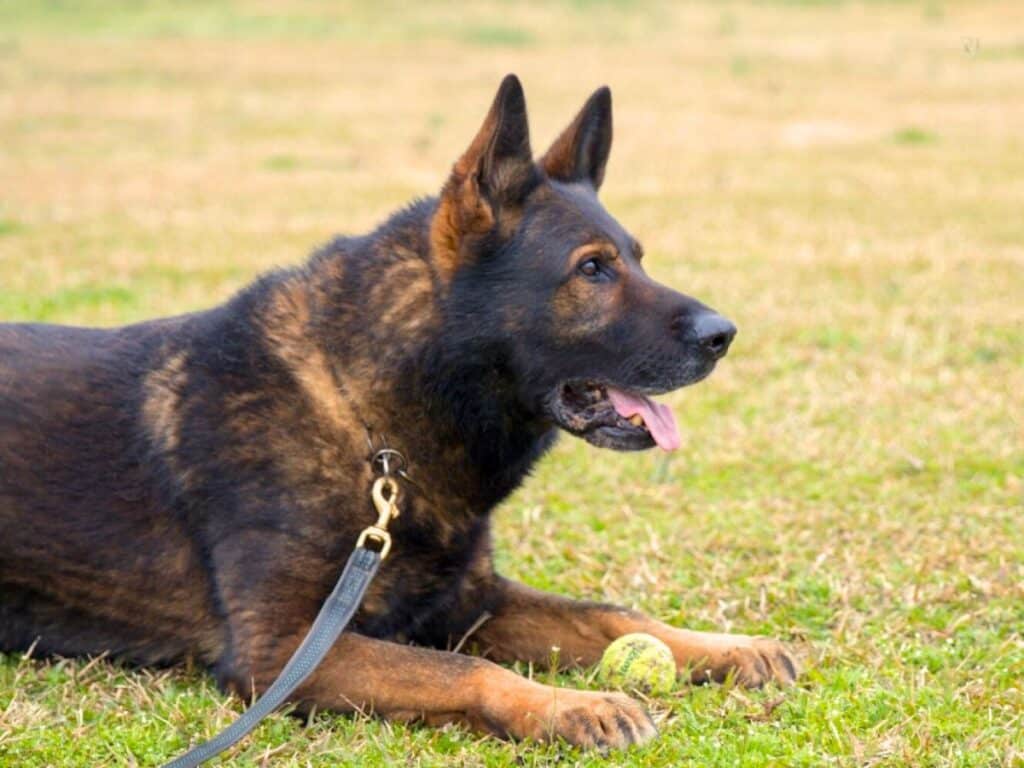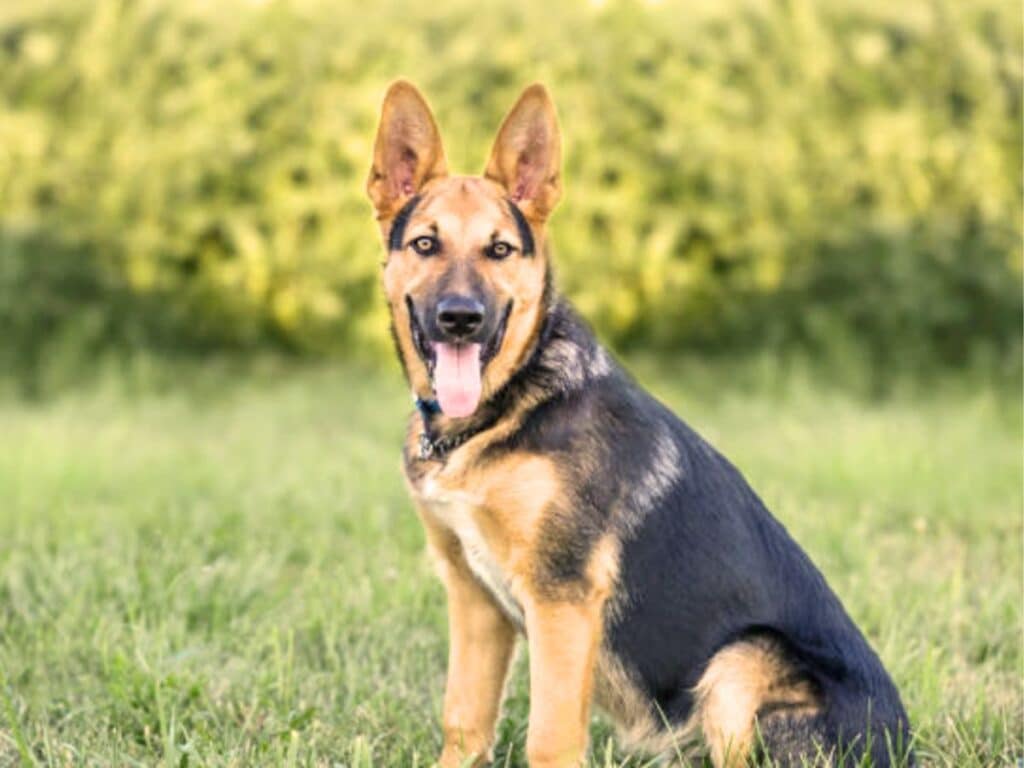7-month-old German Shepherds are at a unique stage in their development. They are no longer puppies, but they still have a lot of growing to do.
At this age, German Shepherds are highly trainable and can learn new commands in just a few minutes each day.
However, raising a pup comes with its own set of unique challenges, from their physical and mental development to their training and grooming needs.
In this guide, I will provide you with all the information you need to raise a happy, healthy, and well-behaved doggy.
An Overview of 7-Month-Old German Shepherd
The following table provides a comprehensive overview of the typical physical characteristics, behavior and temperament, and developmental milestones of a 7-month-old German Shepherd.
| Height | Male: 18 – 20 inches Female: 17 – 19 inches |
| Weight | Male: 57 – 62 pounds Female: 49 – 53 pounds |
| Coat | Double coat with a dense undercoat and medium-length outer coat |
| Ears | Erect, with a slight lean forward |
| Energy Level | High energy, requires regular exercise and mental stimulation |
| Diet | Feed 3 – 4 cups of high-quality puppy food over 2-3 meals a day |
| Exercise Needs | 1-2 hours of exercise per day, including play, walks, and training |
| Training | Continue basic obedience training, reinforce commands |
| Socialization | Expose to various environments, people, and animals |
| Behavior | Playful, independent, alert, and may be reserved, but not typically aggressive |
| Sleeping Patterns | Needs 14-16 hours of sleep a day |
| Teething | Teething may be ongoing; provide appropriate chew toys |
| Sexual Maturity | Some 7-month-old GSDs may show signs of sexual maturity |

What Does a 7 Month Old German Shepherd Look Like?
A 7-month-old German Shepherd will have a muscular build, a thick, double coat, and erect ears, and a bushy tail. They will be energetic and eager to play and explore.
At this age, a German Shepherd puppy is in the midst of adolescence, transitioning from the puppy stage to adulthood.
While individual dogs may vary, here are some general physical characteristics you can expect in a German Shepherd at this age:
Size: A 7-month-old German Shepherd male is typically 18 – 20 inches tall, whereas the female is 17 – 19 inches tall at the shoulder.
Weight: The weight of a 7-month-old German Shepherd can vary, but on average, they may weigh between 49 to 62 pounds.
Coat: German Shepherds have a double coat. At 7 months, their coat is becoming denser, with a medium length.
Ears: By this age, the puppy’s ears should be fully erect.

Tail: The tail is bushy and typically reaches the hock. While at rest, the tail is usually carried low.
Teeth: At 7 months, a German Shepherd puppy may still be teething. You might notice the adult teeth replacing the puppy teeth.
Overall Build: German Shepherds at this age are muscular and well-proportioned. They are gaining the strength and agility characteristic of the breed.
Gait: The gait at this age is becoming more coordinated and fluid. They are agile and may exhibit a trotting or bounding gait.
Remember that individual variations are common, and the specifics of a dog’s appearance can be influenced by genetics, diet, and overall health.
German Shepherds undergo significant physical and behavioral changes during their growth stages. In my article German Shepherd Male & Female Growth Chart, I break down the different stages of a German Shepherd’s growth, highlighting the key characteristics and milestones during the puppyhood, adolescence, and adulthood phases.
You can also track your German Shepherd pup’s growth according to his/her current age using the following Growth Chart.

7-Month-Old German Shepherd Behavior
At 7 months old, GSDs are still in their adolescent stage and may exhibit certain teenage behaviors:
Aggression
One of the most common behavioral changes that occur during this time is increased aggression.
This is due to rising testosterone levels in male dogs and estrogen levels in female dogs.
As a result, your once friendly and playful pup may become more territorial and protective over their toys or food.

Excessive chewing
Your German Shepherd may have a strong urge to chew on objects as their adult teeth are coming in. Provide appropriate chew toys to redirect their chewing behavior.
Playfulness
They may engage in playful behaviors with you, other pets, or even by themselves.
Excitable and full of energy, your German Shepherd may also jump up on people as a way to greet them. Consistently reinforce the “off” command and reward them for keeping all four paws on the ground.
Leash pulling
As your German Shepherd grows stronger, they may pull on the leash during walks. Use positive reinforcement training techniques to teach them loose leash walking and reward them for walking calmly by your side.
Barking/whining
German Shepherds are known to be vocal dogs, and at 7 months old, they may bark to communicate their needs or express excitement.
Teach them the “quiet” command and redirect their attention to an appropriate activity.
Independence
Adolescence brings a degree of independence. Your German Shepherd may start to test boundaries and assert themselves.
Consistent and positive reinforcement training can help manage any challenging behaviors that may arise.
Alertness
German Shepherds are naturally alert and protective. At 7 months, they may show increased alertness to their surroundings and may start exhibiting protective instincts.
Resource Guarding
Resource guarding occurs when a dog becomes possessive of something they value, such as food, toys, or even people. It can manifest as growling, snarling, biting, or even attacking if the perceived threat is severe enough.
In a 7-month-old German Shepherd, resource guarding can be a sign of insecurity or anxiety. It’s essential to address this behavior early on to prevent it from becoming a severe problem.
Play biting
During play, your German Shepherd may engage in nipping or play biting. Teach them bite inhibition by yelping or saying “ouch” when they bite too hard, and redirect their attention to a toy or appropriate playmate.

Feeding Your 7-Month-Old German Shepherd
How Much Should a 7-Month-Old German Shepherd Eat?
On average, a 7-month-old German Shepherd should eat about 3 to 4 cups of high-quality puppy food spread over 3 meals per day.
Always follow the feeding guidelines provided by the dog food manufacturer as a starting point, and then make adjustments based on your dog’s individual needs.
Feeding Guidelines for Your Pup
At 7 months old, your German Shepherd is still growing and developing, so it’s important to provide them with a balanced and nutritious diet. Here are some feeding guidelines to keep in mind:
Feed a high-quality dog food:
Choose a high-quality dog food that is specifically formulated for large breed puppies or young dogs.
Look for a brand that includes real meat as the first ingredient and avoids artificial additives or fillers.
Appropriate protein and fat content:
German Shepherds require a diet that is rich in protein and healthy fats to support their muscle development and overall health.
Look for dog food that contains at least 25% protein and 15% fat.
Avoid overfeeding:
Overfeeding can lead to excessive weight gain, which can put strain on their growing joints and increase the risk of certain health issues. Stick to the recommended portion sizes and monitor your dog’s weight regularly.
Treats and supplements:
Treats can be given in moderation as rewards during training, but be mindful of their calorie content and avoid overindulging. Additionally, consult with your veterinarian before adding any supplements to your dog’s diet.
Hydration:
Always make sure your German Shepherd has access to fresh, clean water. Hydration is important for their overall health and digestion.
The best way to determine the appropriate amount of food for your specific dog is to consult with your veterinarian. They can consider your dog’s weight, body condition, health status, and any specific dietary requirements.
For more information on dietary guidelines for your pup, please check out my article – How Much To Feed a German Shepherd Puppy
RELATED: Do German Shepherds Drink a Lot of Water?

How To Train a 7-Month-Old German Shepherd
Training an adolescent German Shepherd requires consistency, patience, and positive reinforcement. Here are some steps to help you train your German Shepherd effectively:
1. Start with basic commands:
Begin training by teaching your German Shepherd basic commands such as “sit,” “stay,” “come,” and “down.”
Use treats and praise to reward them when they successfully perform the command. Be consistent in your training sessions and keep them short to maintain their attention span.
RELATED: 30 German Shepherd Training Commands
2. Leash training:
- Practice loose-leash walking. Use treats to reward your dog for walking calmly beside you without pulling.
- Introduce commands like “heel” to encourage proper walking behavior.
RELATED: How To Leash Train a German Shepherd Puppy
3. Crate training:
Introduce your German Shepherd to a crate as a safe and comfortable space. Make it a positive experience by placing treats and toys inside the crate.
Start by leaving the door open and gradually close it for short periods.
This will help with housebreaking and prevent destructive behavior when unsupervised.
RELATED: How to Crate Train a German Shepherd Puppy?
4. Discourage undesirable behaviors:
If your German Shepherd exhibits undesirable behaviors like biting or jumping, use redirection and positive reinforcement. Avoid punishment, as it can lead to fear or anxiety.
RELATED: How To Discipline A German Shepherd Puppy
5. Socialize your German Shepherd:
Expose your German Shepherd to different people, animals, and environments to ensure they become well-rounded and confident.
Take them to dog parks, obedience classes, or arrange playdates with other dogs. This will help prevent any future behavioral issues.
6. Provide mental stimulation:
German Shepherds are intelligent dogs that require mental stimulation to prevent boredom and destructive behavior. Use puzzle toys, obedience training, or interactive games to keep their minds engaged.
7. Enroll in obedience classes:
Consider enrolling your German Shepherd in obedience classes. Professional trainers can provide guidance and socialization in a controlled environment.
8. Exercise regularly:
Ensure your German Shepherd gets regular physical exercise to burn off excess energy. A tired dog is more receptive to training.
RELATED: How Much Exercise Does a German Shepherd Need Daily?
9. Be consistent:
Consistency is key when training a German Shepherd. Use the same commands, rewards, and training techniques consistently to avoid confusion. Set a regular training schedule and stick to it.
Remember that training is an ongoing process, and each dog is unique. Tailor your approach to your German Shepherd’s individual needs, and if you encounter challenges, seek the guidance of a professional dog trainer.

How To Stop 7 Month Old German Shepherd Biting?
Addressing biting behavior involves a combination of training, redirection, and consistency. Here are some steps you can take to discourage and stop biting:
1. Provide Appropriate Chew Toys:
Make sure your German Shepherd has access to a variety of safe and durable chew toys. This will redirect their biting behavior towards appropriate items and help satisfy their natural urge to chew.
2. Teach Bite Inhibition:
- When your German Shepherd bites, immediately respond with a firm “No” or “Ouch” to signal that the behavior is not acceptable.
- If the biting continues, withdraw attention. Turn away, cross your arms, or leave the room briefly. This helps your dog understand that biting results in a loss of attention.
3. Use Redirection:
- When your dog starts to bite, redirect their attention to an appropriate chew toy. Encourage them to chew on the toy instead of your hands or clothing.
Remember, consistency and patience are key when training your German Shepherd to stop biting. With time and proper training, you can help your puppy develop into a well-behaved and non-biting adult dog.
4. Provide Mental and Physical Exercise:
- A tired dog is less likely to engage in unwanted behaviors. Ensure your German Shepherd gets enough physical exercise through walks, playtime, and interactive activities.
- Mental stimulation, such as puzzle toys and training sessions, can also help channel their energy.
5. Consider Professional Training:
- If the biting behavior persists or becomes a serious concern, consider seeking the help of a professional dog trainer or behaviorist. They can provide personalized guidance based on the specific needs of your dog.
For more guidance on teaching bite inhibition to your pup, you can refer to my article: How To Stop German Shepherd Puppy From Biting.
Check out this video of a 7-month-old female German Shepherd undergoing training…

Sexual Maturity of 7-Month-Old German Shepherd
German Shepherds generally reach sexual maturity between 6 to 12 months of age, and individual dogs may vary. At 7 months, some German Shepherds may exhibit signs of sexual maturity, while others may not show clear signs until later.
Here are some common indicators of sexual maturity in a 7-month-old German Shepherd:
Behavioral Changes:
- Increased interest in other dogs, especially those of the opposite sex.
- Marking behavior, such as lifting a leg to urinate (more common in males).
- Changes in social dynamics, including potential signs of dominance or submission.
- Females may exhibit behavior changes, such as increased affection towards their owners or other dogs, restlessness, and a desire to escape.
Physical Changes:
- Swelling of the vulva in females.
- Testicle descent in males (if not already descended).
Heat (Estrus) in Females:
Female German Shepherds may experience their first heat cycle around this age. Signs include a swollen vulva, increased urination, changes in behavior, and attracting male dogs.
To learn more about GSD heat cycle, you may refer to my article – German Shepherd Heat Cycle: Length, Frequency, & Stages
Mounting Behavior:
Both male and female German Shepherds may engage in mounting behavior, which can be a sign of sexual maturity or a display of dominance.
Increased Independence:
Some dogs may become more independent as they reach sexual maturity, as they are driven by natural instincts related to reproduction.
It’s important to note that spaying or neutering your German Shepherd can have an impact on sexual maturity and related behaviors.
Spaying (for females) and neutering (for males) are common practices to prevent unwanted behaviors, reproductive health issues, and unwanted pregnancies.
If you plan to breed your German Shepherd or if you’re considering spaying or neutering, it’s advisable to consult with your veterinarian.
They can provide guidance on the timing and potential benefits or considerations associated with these procedures.
RELATED:
- 8 Month Old German Shepherd: Everything You Need To Know
- 9 Month Old German Shepherd: Everything You Need To Know
7 Month Old German Shepherd Ears Not Up! What to do?

The ears of a German Shepherd puppy typically start to stand up between 4 to 7 months of age. However, there can be variations among individual dogs, and some may take longer for their ears to fully stand.
Here are a few considerations if your 7-month-old German Shepherd’s ears have not yet stood up:
- Genetic Factors: Ear carriage is influenced by genetics. If your German Shepherd’s parents or ancestors had ears that stood up, your dog’s ears will likely follow suit. However, individual variations can occur.
- Teething and Growth Spurts: The process of teething and rapid growth can sometimes affect ear development. The cartilage in the ears may take time to firm up and hold the ears in an erect position. (Research)
- Ear Massaging: Gently massage your dog’s ears, starting from the base and working your way up. This can stimulate blood flow and help with the development of the ear cartilage. Be gentle and do not force the ears into an upright position.
- Consult with the Veterinarian: If your German Shepherd’s ears have not stood up by 7 months, it’s a good idea to consult with your veterinarian. They can assess the situation, provide guidance, and rule out any underlying health issues.
It’s important to note that some German Shepherds may have what is commonly referred to as “soft ears,” where the ears may not stand up completely. In many cases, this is purely cosmetic and does not impact the dog’s health or well-being.
RELATED:

Care Tips For Your 7-month-old GSD
Taking care of your adolescent pup involves a combination of proper nutrition, exercise, training, grooming, and veterinary care.
Here are some care tips to ensure the well-being of your GSD:
- Nutrition:
- Feed your GSD a high-quality puppy food designed for large breeds.
- Follow the recommended feeding guidelines on the dog food packaging, adjusting for your dog’s specific needs, activity level, and weight.
- Provide fresh water at all times.
- Regular Veterinary Check-ups:
- Schedule regular veterinary check-ups to monitor your GSD’s overall health and address any concerns.
- Keep up with vaccinations and preventive care recommended by your veterinarian.
- Exercise:
- According to pdsa.org.uk, German Shepherds are active dogs and need regular exercise. Aim for at least 1-2 hours of exercise per day, including walks, playtime, and mentally stimulating activities.
- Engage in activities that stimulate their intelligence, such as obedience training or puzzle toys.
- Training:
- Continue basic obedience training, reinforcing commands like sit, stay, and recall.
- Socialize your GSD with various environments, people, and other dogs to ensure they become well-adjusted adults.
- Consider enrolling in obedience classes for structured training and socialization.
- Grooming:
- Brush your GSD’s double coat regularly to reduce shedding and prevent matting. German Shepherds shed more heavily during seasonal changes.
- Check ears for signs of infection, and clean them if necessary.
- Trim nails regularly to prevent overgrowth.
- Teething and Chewing:
- Provide appropriate chew toys to satisfy teething needs.
- Rotate toys to keep your GSD interested and prevent boredom-related chewing.
- Spaying/Neutering:
- Discuss spaying or neutering with your veterinarian if you haven’t already done so. This can prevent unwanted behaviors and contribute to long-term health.
- Monitor Weight:
- Keep an eye on your GSD’s weight and body condition. Adjust their diet if needed to maintain a healthy weight.
- Be Observant:
- Keep an eye out for any changes in behavior, appetite, or health. Early detection of issues allows for prompt veterinary attention.
Remember that individual dogs may have unique needs and preferences, so tailor your care approach to your GSD’s specific personality and health considerations.
Conclusion
In conclusion, owning a 7-month-old German Shepherd can be both a rewarding and challenging experience. As your pup grows, you will notice significant changes in its physical appearance and behavior. As a responsible pet owner, it is important to provide them with the proper care and socialization they need to thrive. By doing so, you can develop a strong bond with your furry friend and enjoy many years of love and companionship together.
Frequently Asked Questions (FAQs)
1. Can a 7-month-old German Shepherd get pregnant?
Yes, a 7-month-old German Shepherd can get pregnant. Female dogs typically reach sexual maturity and begin their first heat cycle, also known as estrus, around 6 to 12 months of age.
2. How much does a 7-month-old German Shepherd sleep?
A 7-month-old German Shepherd requires around 14-16 hours of sleep per day, but the amount may vary based on their activity level.
3. How much does a 7-month-old German Shepherd weigh?
A 7-month-old German Shepherd should weigh between 49-62 pounds depending on their gender and genetics.
4. What to expect from a 7-month-old German Shepherd?
Expect a lot of energy, playfulness, curiosity, and affection from a 7-month-old German Shepherd. Consistent training and socialization are crucial at this stage.
5. How big is a 7-month-old German Shepherd?
A 7-month-old German Shepherd should be around 18-20 inches tall at the shoulder for a male and 17-19 inches for a female, but the measurements can vary based on individual growth rate and size.




